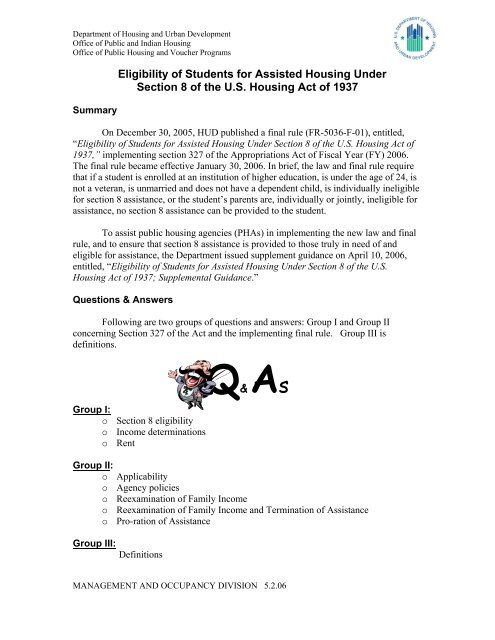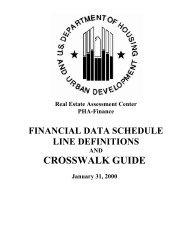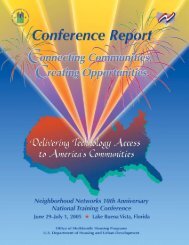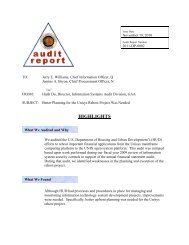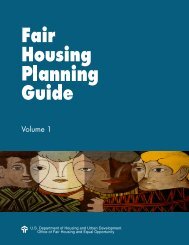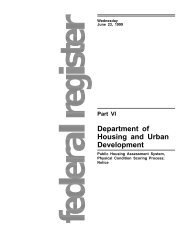Eligibility of Students for Assisted Housing Under Section 8 of ... - HUD
Eligibility of Students for Assisted Housing Under Section 8 of ... - HUD
Eligibility of Students for Assisted Housing Under Section 8 of ... - HUD
Create successful ePaper yourself
Turn your PDF publications into a flip-book with our unique Google optimized e-Paper software.
Department <strong>of</strong> <strong>Housing</strong> and Urban Development<br />
Office <strong>of</strong> Public and Indian <strong>Housing</strong><br />
Office <strong>of</strong> Public <strong>Housing</strong> and Voucher Programs<br />
Summary<br />
<strong>Eligibility</strong> <strong>of</strong> <strong>Students</strong> <strong>for</strong> <strong>Assisted</strong> <strong>Housing</strong> <strong>Under</strong><br />
<strong>Section</strong> 8 <strong>of</strong> the U.S. <strong>Housing</strong> Act <strong>of</strong> 1937<br />
On December 30, 2005, <strong>HUD</strong> published a final rule (FR-5036-F-01), entitled,<br />
“<strong>Eligibility</strong> <strong>of</strong> <strong>Students</strong> <strong>for</strong> <strong>Assisted</strong> <strong>Housing</strong> <strong>Under</strong> <strong>Section</strong> 8 <strong>of</strong> the U.S. <strong>Housing</strong> Act <strong>of</strong><br />
1937,” implementing section 327 <strong>of</strong> the Appropriations Act <strong>of</strong> Fiscal Year (FY) 2006.<br />
The final rule became effective January 30, 2006. In brief, the law and final rule require<br />
that if a student is enrolled at an institution <strong>of</strong> higher education, is under the age <strong>of</strong> 24, is<br />
not a veteran, is unmarried and does not have a dependent child, is individually ineligible<br />
<strong>for</strong> section 8 assistance, or the student’s parents are, individually or jointly, ineligible <strong>for</strong><br />
assistance, no section 8 assistance can be provided to the student.<br />
To assist public housing agencies (PHAs) in implementing the new law and final<br />
rule, and to ensure that section 8 assistance is provided to those truly in need <strong>of</strong> and<br />
eligible <strong>for</strong> assistance, the Department issued supplement guidance on April 10, 2006,<br />
entitled, “<strong>Eligibility</strong> <strong>of</strong> <strong>Students</strong> <strong>for</strong> <strong>Assisted</strong> <strong>Housing</strong> <strong>Under</strong> <strong>Section</strong> 8 <strong>of</strong> the U.S.<br />
<strong>Housing</strong> Act <strong>of</strong> 1937; Supplemental Guidance.”<br />
Questions & Answers<br />
Following are two groups <strong>of</strong> questions and answers: Group I and Group II<br />
concerning <strong>Section</strong> 327 <strong>of</strong> the Act and the implementing final rule. Group III is<br />
definitions.<br />
Group I:<br />
o <strong>Section</strong> 8 eligibility<br />
o Income determinations<br />
o Rent<br />
Q& As<br />
Group II:<br />
o Applicability<br />
o Agency policies<br />
o Reexamination <strong>of</strong> Family Income<br />
o Reexamination <strong>of</strong> Family Income and Termination <strong>of</strong> Assistance<br />
o Pro-ration <strong>of</strong> Assistance<br />
Group III:<br />
Definitions<br />
MANAGEMENT AND OCCUPANCY DIVISION 5.2.06
Group I—<strong>Section</strong> 8 <strong>Eligibility</strong>, Income Determinations, and Rent<br />
<strong>Section</strong> 327 <strong>of</strong> the<br />
FY 2006<br />
Appropriations Act<br />
Final Rule,<br />
FR-5036-F-<br />
01<br />
Question<br />
Answer<br />
1<br />
*<br />
<strong>Section</strong>s<br />
327(a) and (b)<br />
<strong>Section</strong><br />
5.612 and<br />
5.609(b)(9)<br />
Do the Act and final rule apply to the<br />
Public <strong>Housing</strong> program?<br />
No. The Act and the implementing final rule (FR-5036-F-01) do not apply to<br />
the Public <strong>Housing</strong> program. The Act and final rule apply only to <strong>Section</strong> 8<br />
programs.<br />
2<br />
*<br />
<strong>Section</strong>s<br />
327(a) and (b)<br />
<strong>Section</strong><br />
5.612 and<br />
5.609(b)(9)<br />
Do the Act and final rule apply to<br />
students that currently reside with<br />
parents in a section 8 rental assisted<br />
unit or students applying <strong>for</strong> section 8<br />
assistance with their parents?<br />
No. The new law and final rule do not apply to these students. The law and<br />
final rule focus on students who are under the age <strong>of</strong> 24, are not veterans, are<br />
unmarried, or are without children who seek or receive section 8assistance<br />
separate from their parents.<br />
3<br />
*<br />
<strong>Section</strong><br />
327(a)(1)<br />
<strong>Section</strong><br />
5.612(a)<br />
Do the student eligibility requirements<br />
apply to full and part-time students who<br />
are enrolled at an institution <strong>of</strong> higher<br />
education?<br />
Yes. The eligibility requirements apply to both full and part-time students<br />
enrolled at an institution <strong>of</strong> higher education, as defined under 102 <strong>of</strong> the<br />
Higher Education Act <strong>of</strong> 1965 (20 U.S.C. 1002).<br />
4<br />
*<br />
<strong>Section</strong><br />
327(a)(1)-(6)<br />
<strong>Section</strong><br />
5.612(a)-(f)<br />
Do the Act and final rule provisions<br />
mean that a student enrolled at an<br />
institution <strong>of</strong> higher education who is<br />
under the age <strong>of</strong> 24, not a veteran,<br />
unmarried, and does not have any<br />
dependent children applying <strong>for</strong><br />
<strong>Section</strong> 8 assistance in the <strong>Section</strong> 8<br />
program is ineligible <strong>for</strong> <strong>Section</strong> 8<br />
assistance?<br />
Yes. The Act and final rule provisions mean that any student who is enrolled<br />
at an institution <strong>of</strong> higher education who is under the age <strong>of</strong> 24, is not a<br />
veteran, unmarried, and does not have any children, and is individually<br />
ineligible <strong>for</strong> section 8 assistance, or the student’s parents are individually or<br />
jointly, ineligible <strong>for</strong> assistance, no section 8 assistance can be provided to<br />
the student. Unless the student is determined independent (by PHAs) from<br />
his or her parents, as discussed in this guidance, the eligibility <strong>of</strong> a student<br />
seeking section 8 assistance will be based on both the student and the<br />
parents being determined income eligible <strong>for</strong> section 8 assistance OR<br />
whether the student’s parents, individually or jointly, are income eligible <strong>for</strong><br />
<strong>Section</strong> 8 assistance. Both the student’s income and the parents’ income<br />
must be separately assessed <strong>for</strong> income eligibility. Additionally, the financial<br />
assistance <strong>of</strong> the student in excess <strong>of</strong> tuition will be included in annual income<br />
MANAGEMENT AND OCCUPANCY DIVISION 5.2.06 * Required Source: Final Rule dtd: 12/30/05<br />
Notice dtd: 04/10/06
Group I—<strong>Section</strong> 8 <strong>Eligibility</strong>, Income Determinations, and Rent<br />
<strong>Section</strong> 327 <strong>of</strong> the<br />
FY 2006<br />
Appropriations Act<br />
Final Rule,<br />
FR-5036-F-<br />
01<br />
Question<br />
Answer<br />
when determining the student’s eligibility <strong>for</strong> section 8 assistance, unless the<br />
student is over the age <strong>of</strong> 23 with dependent children, and <strong>for</strong> rent calculation<br />
purposes as addressed in section II, E <strong>of</strong> this notice.<br />
5<br />
*<br />
<strong>Section</strong><br />
327(a)(6)<br />
<strong>Section</strong><br />
5.612(f)<br />
Concerning the eligibility <strong>of</strong> parents,<br />
individually or jointly, do parents have<br />
to meet all <strong>HUD</strong> program eligibility<br />
requirements in order <strong>for</strong> the student to<br />
be eligible <strong>for</strong> <strong>Section</strong> 8 housing<br />
assistance?<br />
No. Since <strong>Section</strong> 327 is focused on income eligibility <strong>of</strong> a higher education<br />
student, the Department interprets the section’s reference to the eligibility <strong>of</strong><br />
the parents to also refer to income eligibility.<br />
6 <strong>Section</strong><br />
327(a)(6)<br />
<strong>Section</strong><br />
5.612(f)<br />
Also concerning the eligibility <strong>of</strong><br />
parents, individually or jointly, how<br />
does the PHA know whether to<br />
determine the eligibility <strong>of</strong> the parents<br />
“individually” or “jointly”? Are there any<br />
established criteria a PHA may use in<br />
making this determination?<br />
PHAs may adopt and implement the following criteria <strong>for</strong> determining<br />
whether to obtain the declaration and certification <strong>of</strong> income from parents,<br />
individually or jointly.<br />
• If the student’s parents are married and living with each other, obtain the<br />
declaration and certification <strong>of</strong> income from each parent.<br />
• If the student’s parent is widowed or single, obtain the declaration and<br />
certification <strong>of</strong> income from that parent.<br />
• If the student’s parents are divorced or separated, obtain the declaration<br />
and certification <strong>of</strong> income from each parent.<br />
• If the student has been living with one <strong>of</strong> his or her parents and has not<br />
had contact with or does not know where to contact his or her other<br />
parent, obtain from the student a certification under penalty <strong>of</strong> perjury,<br />
addressing the circumstances (including a statement that the student<br />
has not received financial assistance from the parent) and obtain from<br />
the parent whom the student has been living or has contact with the<br />
declaration and certification <strong>of</strong> income.<br />
7 <strong>Section</strong> <strong>Section</strong> In determining the eligibility <strong>of</strong> the<br />
parent(s) to receive assistance, which<br />
The PHA should use the Income Limit <strong>for</strong> the area where the parent(s)<br />
resides (24 CFR 982.201(b)(4)). In the example provided, the PHA should<br />
MANAGEMENT AND OCCUPANCY DIVISION 5.2.06 * Required Source: Final Rule dtd: 12/30/05<br />
2 Notice dtd: 04/10/06
Group I—<strong>Section</strong> 8 <strong>Eligibility</strong>, Income Determinations, and Rent<br />
<strong>Section</strong> 327 <strong>of</strong> the Final Rule,<br />
FY 2006<br />
FR-5036-F-<br />
Question<br />
Appropriations Act<br />
01<br />
327(a)(6) 5.612(f) <strong>HUD</strong> Income Limit area should the<br />
PHA use: the income limit <strong>for</strong> the area<br />
where the student intends to reside, or<br />
the income limit <strong>for</strong> the area where the<br />
parent(s) currently resides? For<br />
example, if the student is applying <strong>for</strong><br />
<strong>Section</strong> 8 housing assistance in<br />
Johnson City, Tennessee, but the<br />
parent(s) lives in New York City, New<br />
York, which <strong>HUD</strong> Income Limit area<br />
should be used in determining the<br />
parent(s) program eligibility?<br />
Answer<br />
use the income limit <strong>for</strong> the area in New York where the parent(s) lives.<br />
8<br />
*<br />
<strong>Section</strong><br />
327(a)(6)<br />
<strong>Section</strong><br />
5.612(f)<br />
Which income limit (i.e., extremely lowincome,<br />
very-low income, or lowincome)<br />
should a PHA use in<br />
determining the income eligibility <strong>of</strong> the<br />
parent(s)?<br />
Both students and parents must meet the low-income limit.<br />
9 <strong>Section</strong><br />
327(a)(6)<br />
<strong>Section</strong><br />
5.612(f)<br />
How should the PHA define parents?<br />
What if the student lives with a<br />
grandparent, aunt, uncle, guardian,<br />
etc., do they have to meet the<br />
qualifications also?<br />
For purposes <strong>of</strong> the student eligibility restrictions, and consistent with longstanding<br />
<strong>HUD</strong> policy regarding eligibility <strong>for</strong> the section 8 programs, the term<br />
“parents” means the biological or adoptive parents, or guardians (e.g., stepparents,<br />
grandparents, aunt/uncle, godparents, etc.), or such other definition<br />
as may be adopted by the PHA, Owner, or Manager through appropriate<br />
amendment to its admissions policies.<br />
10 <strong>Section</strong><br />
327(a)(6)<br />
<strong>Section</strong><br />
5.612(f)<br />
In admitting college students to <strong>Section</strong><br />
8 rental programs, it appears that the<br />
PHA will now have to determine the<br />
Correct. The PHA will have to determine the eligibility <strong>of</strong> each student family<br />
member, parents (in cases where the student has not established<br />
independence from parents), and the student family household as a unit. For<br />
example, three college students applying <strong>for</strong> <strong>Section</strong> 8 rental housing<br />
MANAGEMENT AND OCCUPANCY DIVISION 5.2.06 * Required Source: Final Rule dtd: 12/30/05<br />
3 Notice dtd: 04/10/06
Group I—<strong>Section</strong> 8 <strong>Eligibility</strong>, Income Determinations, and Rent<br />
<strong>Section</strong> 327 <strong>of</strong> the Final Rule,<br />
FY 2006<br />
FR-5036-F-<br />
Question<br />
Appropriations Act<br />
01<br />
* eligibility <strong>of</strong> the:<br />
1. Student<br />
2. Parent(s), unless the income <strong>of</strong><br />
the student’s parents is not<br />
relevant or the student can<br />
demonstrate to the absence <strong>of</strong>,<br />
or his or her independence from<br />
Parents.<br />
3. Student family household<br />
Answer<br />
assistance, as a family unit, would have to be income eligible <strong>for</strong> <strong>Section</strong> 8<br />
assistance (24 CFR 982.201). Also, under 5.612(f), each student individually<br />
would have to be eligible and the parent(s) <strong>of</strong> each student would have to be<br />
eligible <strong>for</strong> <strong>Section</strong> 8 rental assistance, unless the student can show the<br />
income <strong>of</strong> the student’s parents is not relevant or the student can<br />
demonstrate to the absence <strong>of</strong>, no financial support from parent(s) or his or<br />
her independence from, parents.<br />
11<br />
*<br />
<strong>Section</strong> 327(b)<br />
<strong>Section</strong><br />
5.609(b)(9)<br />
What exactly are the types <strong>of</strong> “financial<br />
assistance” under the Higher<br />
Education Act <strong>of</strong> 1965 that must be<br />
considered as income under <strong>Section</strong><br />
327?<br />
Types <strong>of</strong> financial assistance under the Higher Education Act <strong>of</strong> 1965 would<br />
include: the Pell Grant, the Federal Supplemental Educational Opportunity<br />
Grant (FSEOG), Academic Achievement Incentive Scholarships, State<br />
assistance under the Leveraging Educational Assistance Partnership<br />
Program, the Robert C. Byrd Honors Scholarship Program, and federal Work-<br />
Study (FWS) programs. Although considered “financial assistance” under the<br />
Higher Education Act <strong>of</strong> 1965, Perkins loans, Staf<strong>for</strong>d loans, and Plus loans<br />
are not considered income <strong>for</strong> purposes <strong>of</strong> determining student eligibility <strong>for</strong><br />
<strong>Section</strong> 8 housing assistance. For complete in<strong>for</strong>mation, see Title IV, Part A,<br />
under the Higher Education Act <strong>of</strong> 1965, as amended, located at:<br />
http://www.ed.gov/policy/highered/leg/hea98/index.html<br />
12<br />
*<br />
<strong>Section</strong> 327(b)<br />
<strong>Section</strong><br />
5.609(b)(9)<br />
Is the income students receive from<br />
federal Work-Study (FWS) programs<br />
considered earned income <strong>for</strong><br />
purposes <strong>of</strong> determining income<br />
eligibility?<br />
Yes. It is considered financial assistance under the Higher Education Act <strong>of</strong><br />
1965. If its financial assistance under the Act, then it is counted as income<br />
under 327.<br />
MANAGEMENT AND OCCUPANCY DIVISION 5.2.06 * Required Source: Final Rule dtd: 12/30/05<br />
4 Notice dtd: 04/10/06
Category<br />
Group II—Applicability, Agency Policies, Verifications/Reexaminations,<br />
Continuation and Termination <strong>of</strong> Assistance (24 CFR 982.552(b)(5))<br />
Question<br />
Answer<br />
13<br />
*<br />
Applicability<br />
Will the students currently participating in<br />
<strong>HUD</strong>’s <strong>Section</strong> 8 program be grandfathered<br />
into the program? Does the rule apply to<br />
existing <strong>Section</strong> 8 student participants?<br />
No. Neither section 327 nor the final rule provides <strong>for</strong> a grandfathering clause <strong>for</strong><br />
current <strong>Section</strong> 8 student participants. There<strong>for</strong>e, section 327 and the final rule apply to<br />
existing <strong>Section</strong> 8 student participants. However, as previously stated, the law and final<br />
rule do not focus on students residing with their parents in a section 8 assisted unit or<br />
students who reside with their parents who are applying to receive section 8<br />
assistance. Rather, it focuses on certain students who seek or receive section 8<br />
assistance, separate from their parents.<br />
14<br />
*<br />
Agency Policies<br />
Do PHAs have to update their Administrative<br />
Policies (24 CFR 982.54) be<strong>for</strong>e<br />
implementing <strong>Section</strong> 327 and final rule?<br />
Yes. PHAs must immediately update their Administrative Plans to reflect discretionary<br />
policies concerning the new income eligibility restrictions <strong>for</strong> students (24 CFR 982.54).<br />
15<br />
*<br />
Verifications<br />
Will PHAs now be required to obtain income<br />
in<strong>for</strong>mation on the parents, in determining the<br />
eligibility <strong>of</strong> parents <strong>for</strong> <strong>Section</strong> 8 rental<br />
assistance?<br />
Yes. To satisfy this requirement, PHAs may accept from a parent (s) a declaration<br />
certification <strong>of</strong> income, which includes a penalty <strong>of</strong> perjury. The PHA retains the<br />
right to request and review, supporting documentation at any time the PHA determines<br />
the declaration, certification, and eligibility are in question.<br />
Supporting documentation includes, but is not limited to: IRS tax returns, consecutive<br />
and original pay stubs, bank statements, pension benefit statements, Temporary<br />
Assistance to Needy Families (TANF) award letter, Social Security Administration<br />
(SSA) award letter, other <strong>of</strong>ficial and authentic documents from a federal, State, or<br />
MANAGEMENT AND OCCUPANCY DIVISION 5.2.06 * Required Source: Final Rule dtd: 12/30/05<br />
5 Notice dtd: 04/10/06
Group II—Applicability, Agency Policies, Verifications/Reexaminations,<br />
Continuation and Termination <strong>of</strong> Assistance (24 CFR 982.552(b)(5))<br />
Category Question Answer<br />
local agency.<br />
16<br />
*<br />
Verifications<br />
Since <strong>Section</strong> 8 assistance can no longer be<br />
provided to certain students (24 CFR 5.612),<br />
and this may include a parent‘s income<br />
eligibility test, does this mean that PHAs will<br />
have to verify the parent’s income eligibility<br />
annually, during reexamination, to determine<br />
whether the student continues to be eligible<br />
<strong>for</strong> the program after admissions? Prior to the<br />
effective date <strong>of</strong> the final rule, PHAs<br />
administering <strong>Section</strong> 8 programs did not<br />
have to verify the income <strong>of</strong> eligibility (i.e.,<br />
family meets income limits) <strong>of</strong> the family after<br />
admissions.<br />
PHAs administering the <strong>Section</strong> 8 program will have to verify the income eligibility <strong>of</strong><br />
the parent(s), at least annually, to determine whether the student remains eligible <strong>for</strong><br />
the <strong>Section</strong> 8 program. In accordance with 24 CFR 982.552(b)(5), if after reexamining<br />
the parent’s income, the student is determined to be ineligible <strong>for</strong> <strong>Section</strong> 8 assistance,<br />
as specified in 24 CFR 5.612, the PHA must terminate assistance to that family<br />
member (i.e., student). Again, the family is entitled to an in<strong>for</strong>mal hearing to discuss the<br />
termination <strong>of</strong> assistance.<br />
17 Reexamination<br />
<strong>of</strong> Family<br />
Income<br />
The preamble <strong>of</strong> the final rule “strongly<br />
encourages PHAs, Owners, and<br />
Management Agents administering <strong>Section</strong> 8<br />
programs to, as soon as it is practicable,<br />
recertify existing <strong>Section</strong> 8 participants that<br />
have family members that may meet the<br />
requirements <strong>of</strong> <strong>Section</strong> 327 <strong>of</strong> the Act.” What<br />
does this mean? What happens if the PHA<br />
cannot recertify <strong>Section</strong> 8 participants until<br />
the family’s next annual recertification? Will<br />
the PHA be penalized?<br />
<strong>HUD</strong> understands that some PHAs may not have the resources or the capability to<br />
recertify participant family income until the family’s next annual recertification.<br />
However, in order to remedy the problem <strong>of</strong> ineligible college students participating in<br />
<strong>HUD</strong>’s <strong>Section</strong> 8 rental assistance programs, as quickly as possible, the Department<br />
recommends recertification sooner rather than later (i.e., as soon as it is practicable). If<br />
a PHA is unable to recertify family income until the next annual reexamination, that<br />
PHA will not be penalized. The latest time, however, that the eligibility and income<br />
requirements can be implemented is at the time <strong>of</strong> annual reexamination.<br />
18<br />
*<br />
Reexamination<br />
<strong>of</strong> Family<br />
Income and<br />
As it concerns 24 CFR 982.552(b)(5) <strong>of</strong> the<br />
final rule, if after reexamining a student<br />
household’s income (the student’s or<br />
Yes. Applicant and participant student households are entitled to request and receive<br />
an in<strong>for</strong>mal hearing to discuss the reasons <strong>for</strong> the denial or termination <strong>of</strong> assistance,<br />
in accordance with established program procedures and requirements (See 24 CFR<br />
MANAGEMENT AND OCCUPANCY DIVISION 5.2.06 * Required Source: Final Rule dtd: 12/30/05<br />
6 Notice dtd: 04/10/06
Group II—Applicability, Agency Policies, Verifications/Reexaminations,<br />
Continuation and Termination <strong>of</strong> Assistance (24 CFR 982.552(b)(5))<br />
Category Question Answer<br />
Termination <strong>of</strong><br />
Assistance<br />
parent(s) income), the PHA determines the<br />
student is no longer eligible <strong>for</strong> <strong>Section</strong> 8<br />
rental assistance, is the student family<br />
entitled to a grievance hearing?<br />
982.554 and 24 CFR 982.555, respectively).<br />
19 Continuation<br />
and<br />
Termination <strong>of</strong><br />
Assistance<br />
20 Continuation<br />
and<br />
Termination <strong>of</strong><br />
Assistance<br />
21 Pro-ration <strong>of</strong><br />
Assistance<br />
Scenario I: Three full-time college students<br />
apply <strong>for</strong> <strong>Section</strong> 8 housing. Two are eligible<br />
under <strong>Section</strong> 327(a) <strong>of</strong> the Act and 24 CFR<br />
5.612 <strong>of</strong> the final rule, and one student is<br />
ineligible. Does the PHA deny <strong>Section</strong> 8<br />
rental housing assistance to the entire<br />
family—all three students—or can the<br />
student family choose to remove the ineligible<br />
student from the family application so the two<br />
eligible students can be admitted to the<br />
program?<br />
Scenario II: Three full-time college students<br />
are residing in a <strong>Section</strong> 8 rental assistance<br />
unit. Two are eligible under <strong>Section</strong> 327(a) <strong>of</strong><br />
the Act and 24 CFR 5.612 <strong>of</strong> the final rule,<br />
and one student is ineligible. Does the PHA<br />
terminate the <strong>Section</strong> 8 rental assistance to<br />
the entire family—all three students—or can<br />
the student family choose to remove the<br />
ineligible student from the student household<br />
so the two eligible students can continue to<br />
be assisted under the program.<br />
Can the PHA prorate the student household’s<br />
assistance, based on a percentage <strong>of</strong> the<br />
In scenario I described, the PHA will notify the applicant student family <strong>of</strong> its decision to<br />
deny assistance to the student household because <strong>of</strong> one <strong>of</strong> the student ‘s ineligibility<br />
<strong>for</strong> <strong>Section</strong> 8 assistance. The notice will state that the student household may request<br />
an in<strong>for</strong>mal review <strong>of</strong> the PHA’s decision and how to obtain the review (24 CFR<br />
982.554). During the in<strong>for</strong>mal review, the student family may choose to remove the<br />
ineligible student from the family application <strong>for</strong> assistance so that the two eligible<br />
students may be admitted to the program. The PHA must notify the student household<br />
<strong>of</strong> the PHA’s final decision after the in<strong>for</strong>mal review, including a brief statement <strong>of</strong> the<br />
reasons <strong>for</strong> the final decision.<br />
In scenario II described, the PHA will notify the student household <strong>of</strong> its decision to<br />
terminate <strong>Section</strong> 8 rental assistance to the family. The notice will contain a brief<br />
reason <strong>for</strong> the PHA’s decision (i.e., ineligibility <strong>of</strong> a college student 24 CFR 5.612) and<br />
in<strong>for</strong>m the student household <strong>of</strong> its right to an in<strong>for</strong>mal hearing. For the housing choice<br />
voucher (HCV) program, eligible students residing in households with ineligible<br />
students shall not have their assistance terminated, but shall be issued a voucher to<br />
move with continued assistance in accordance with program regulations or shall be<br />
given the opportunity to lease in place if the terminated ineligible student members<br />
elect to move out <strong>of</strong> the assisted unit. <strong>HUD</strong> will issue separate guidance <strong>for</strong> PHAs<br />
administering the Moderate Rehabilitation, Project-Based Certificate, and Project-<br />
Based Voucher programs.<br />
No. PHAs may not prorate assistance to family households composed <strong>of</strong> eligible and<br />
ineligible students.<br />
MANAGEMENT AND OCCUPANCY DIVISION 5.2.06 * Required Source: Final Rule dtd: 12/30/05<br />
7 Notice dtd: 04/10/06
Group II—Applicability, Agency Policies, Verifications/Reexaminations,<br />
Continuation and Termination <strong>of</strong> Assistance (24 CFR 982.552(b)(5))<br />
Category Question Answer<br />
* total number <strong>of</strong> members <strong>of</strong> the family<br />
household that are eligible <strong>for</strong> assistance?<br />
MANAGEMENT AND OCCUPANCY DIVISION 5.2.06 * Required Source: Final Rule dtd: 12/30/05<br />
8 Notice dtd: 04/10/06
<strong>Section</strong> 327 <strong>of</strong> the<br />
FY 2006<br />
Appropriations Act<br />
Final Rule<br />
Group III—Definitions<br />
FR-5036-F-01 Questions<br />
Answers<br />
<strong>Section</strong> 327(a)(1) <strong>Section</strong> 5.612(a) What is the definition <strong>of</strong> an institution <strong>of</strong> higher<br />
education under section 102 <strong>of</strong> the Higher<br />
Education Act <strong>of</strong> 1965?<br />
Also provided in Appendix A <strong>of</strong> the supplemental<br />
guidance, a complete definition <strong>of</strong> an institution <strong>of</strong> higher<br />
education under section 102 <strong>of</strong> the Higher Education Act<br />
<strong>of</strong> 1965 (20 U.S.C. 1002) can be found on GPO Access,<br />
United States Code Main Page at:<br />
http://www.gpoaccess.gov/uscode/index.html.<br />
<strong>Section</strong> 327(a)(3) <strong>Section</strong> 5.612(c) What is the definition <strong>of</strong> a “veteran”? For purposes <strong>of</strong> administering the student eligibility<br />
restrictions, PHAs may find it useful to adopt the term<br />
“veteran” as used by the Department <strong>of</strong> Veterans Affairs<br />
(38 U.S.C. 101(2)): (2) the term “veterans” means a<br />
person who served in the active military, naval, or air<br />
service, and who was discharged or released there from<br />
under conditions other than dishonorable. A complete<br />
definition <strong>of</strong> veteran (38 U.S.C. 101) can be found on<br />
GPO Access, United States Code Main Page at:<br />
http://www.gpoaccess.gov/uscode/index.html.<br />
<strong>Section</strong>s 327(a) and (b)<br />
*<br />
<strong>Section</strong>s 5.612(e)<br />
and 5.609(b)(9)<br />
As used in the Act and final rule, how are the terms<br />
“dependent child” and “dependent children”<br />
defined?<br />
“Dependent child” and “dependent children,” as used in<br />
the Act and final rule, have the same meaning as<br />
provided at 24 CFR 5.603: Dependent: A member <strong>of</strong> the<br />
family (except foster children and foster adults) other<br />
than the family head or spouse, who is under 18 years<br />
<strong>of</strong> age, or a person with a disability, or is a full-time<br />
student. To be sure, the child or children must reside in<br />
the student family household.<br />
MANAGEMENT AND OCCUPANCY DIVISION 5.2.06 * Required Source: Final Rule dtd: 12/30/05<br />
9 Notice dtd: 04/10/06
Group III—Definitions<br />
<strong>Section</strong> 327 <strong>of</strong> the<br />
FY 2006 Appropriations Act<br />
Final Rule<br />
FR-5036-F-01<br />
Questions<br />
Answers<br />
<strong>Section</strong> 327(b)<br />
*<br />
<strong>Section</strong><br />
5.609(b)(9)<br />
Does financial assistance include federal,<br />
State, and local grants, scholarships, and<br />
loans?<br />
Student financial assistance, as used in the Act and final<br />
rule, means any assistance (in excess <strong>of</strong> amounts<br />
received <strong>for</strong> tuition) that an individual receives:<br />
<strong>Section</strong> 327(b) states: “any financial<br />
assistance (in excess <strong>of</strong> amounts received<br />
<strong>for</strong> tuition) that an individual receives under<br />
the Higher Education Act <strong>of</strong> 1965 (20 U.S.C.<br />
1001 et seq.), from private sources, or an<br />
institution <strong>of</strong> higher education (as defined<br />
under the Higher Education Act <strong>of</strong> 1965 (20<br />
U.S.C. 1002)), shall be considered income to<br />
that individual, except <strong>for</strong> a person over the<br />
age <strong>of</strong> 23 with dependent children.''<br />
(1) <strong>Under</strong> the Higher Education Act <strong>of</strong> 1965<br />
(2) From private sources<br />
(3) From an institute <strong>of</strong> higher education<br />
Such financial assistance may include federal, State, and<br />
local grants and scholarships (athletic and academic),<br />
fellowships and student educational financial assistance<br />
from parents, guardians, or other persons residing outside<br />
<strong>of</strong> the student family household. <strong>HUD</strong> has interpreted the<br />
term “financial assistance,” as used in <strong>Section</strong> 327(b) to<br />
not include loan proceeds <strong>for</strong> the purpose <strong>of</strong> determining<br />
income.<br />
<strong>Section</strong> 327(b)<br />
*<br />
<strong>Section</strong><br />
5.609(b)(9)<br />
In the new law, how is student to be defined?<br />
Student means all students enrolled either full-time or parttime<br />
at an institution <strong>of</strong> higher education. The new law<br />
does not exempt part-time students.<br />
<strong>Section</strong> 327(b)<br />
<strong>Section</strong><br />
5.609(b)(9)<br />
What is included in tuition? Does it include<br />
other fees charged by the educational<br />
institution?<br />
Tuition shall have the meaning given this term by the<br />
institution <strong>of</strong> higher education in which the student is<br />
enrolled.<br />
MANAGEMENT AND OCCUPANCY DIVISION 5.2.06 * Required Source: Final Rule dtd: 12/30/05<br />
10 Notice dtd: 04/10/06
MANAGEMENT AND OCCUPANCY DIVISION 5.2.06 * Required Source: Final Rule dtd: 12/30/05<br />
11 Notice dtd: 04/10/06


